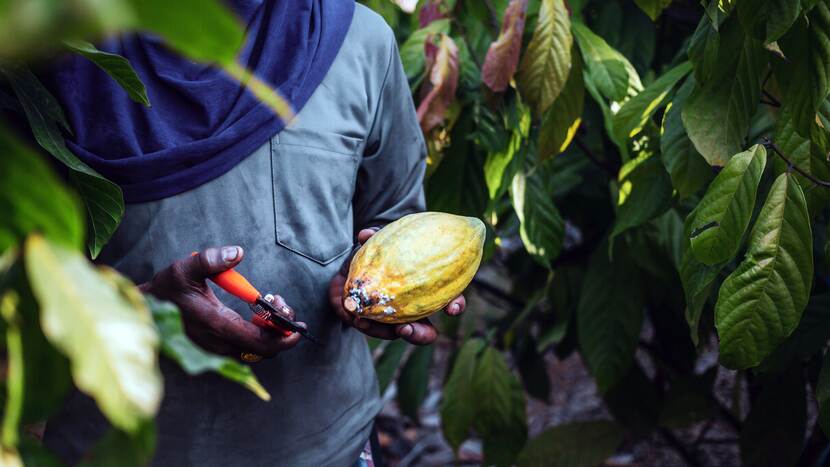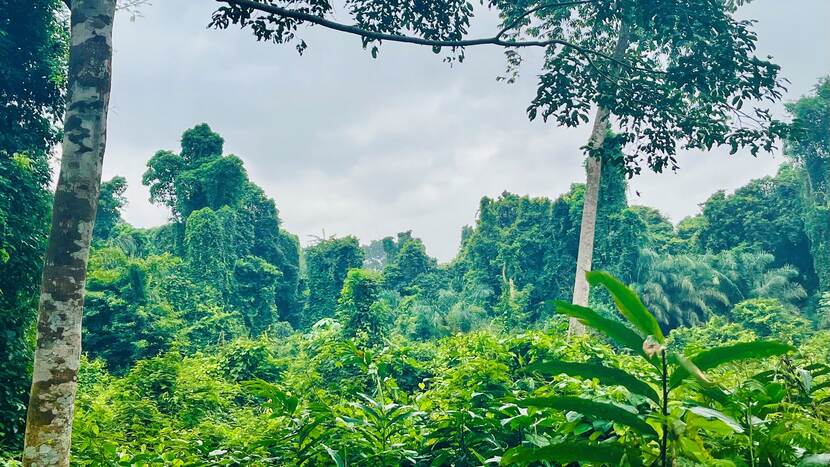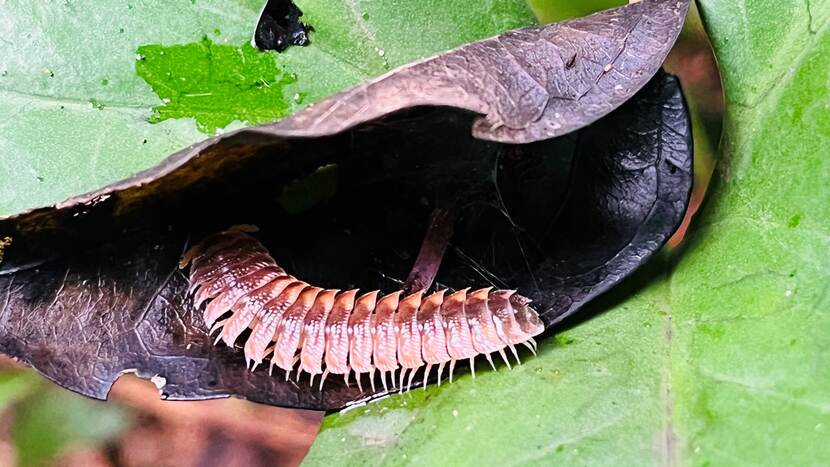Côte d’Ivoire’s cocoa sector ready to combat deforestation
In Côte d’Ivoire (CDI), extensive deforestation driven by agricultural expansion and illegal mining threatens vital ecosystems, with 90% of natural forests lost since 1950. The European Union’s Deforestation Regulation (EUDR) offers hope by requiring traceability for commodities like cocoa entering the EU. The question is: how ready is CDI’s cocoa sector?

The EUDR resonates significantly with all continents. In West-Africa, CDI stands at the forefront of countries affected by the EUDR, given its prominence in the production of commodities like cocoa, coffee, rubber, and palm oil, which are all linked to deforestation. The regulation's mandate to trace commodities like cocoa – the most important export product of the country that makes the Netherlands its most important trading partner – directly impacts the nation's agricultural sector and overall economy. This makes it challenging to adhere to EU regulations.
‘Capacity building is required to bridge the gap between existing systems and EUDR requirements’
Challenges for the cocoa sector
The application of the EUDR in CDI is facing several challenges and limitations, including:
- Capacity building and awareness: there is a lack understanding among farmers and cooperatives about the specific requirements of the EUDR.
- Legal and institutional framework: national regulations are not yet aligned with the EUDR. A concrete example is that the Ivorian definition of forests differs from the EUDR definition.
- Compliance costs: meeting EU standards entails significant costs for businesses, especially for SMEs and smallholder farmers, e.g., related to increased paperwork for traceability measures.
- Traceability system: unifying traceability systems for transparency is a challenge.
State of EUDR compliance
According to Wim Simonse, the CEO of Away4Africa (a Dutch consultancy firm and business providing solutions and business-oriented services to companies and cooperatives), CDI shows serious commitment to adhere to the EUDR. ‘In our work on digital tooling to facilitate traceability, we see a strong involvement from local actors to make it work; they want to be ready in time.’ Indeed, CDI’s compliance to the EUDR is on the right track though it still needs to tackle its complex challenges.
The due diligence process in CDI involves a combination of industry-led initiatives (such as agroforestry and certification), government regulations, technological innovations for traceability systems (such as digitalization and electronic payments), and stakeholder collaboration aimed at promoting responsible supply chain practices and sustainable development. The stakeholders affected by the EUDR in CDI include the national government, private sector (such as cocoa and chocolate industry as well as cocoa exporters), and small farmers.
‘The stakeholders affected by EU regulations in Côte d’Ivoire include national government, private sector, and small farmers’
How ready is the Ivorian Government?
CDI is currently in dialogue with the EU to meet the new standards. The Ivorian Government has taken steps to address challenges through policies like a zero deforestation strategy (website is in French) and the Cocoa & Forests Initiative.
The Coffee and Cocoa Board, responsible for the management of the country’s cocoa sector and its promotion at a national and international level, is working on a traceability system based on farm mapping. This process aims to create a comprehensive database that provides accurate information about the number of farmers, their locations, land size, and relevant socio-economic details. It should thus provide a solid foundation for implementing targeted interventions, fostering sustainability, and ensuring the traceability of cocoa products in line with the EUDR.
How ready are Ivorian’s operators?
Cocoa operators in the Dutch Initiative on Sustainable Cocoa (DISCO) - such as Olam, Barry-Callebaut and Cargill - play a critical role in driving EUDR compliance. By implementing sustainable farming practices, promoting responsible sourcing, and ensuring compliance with traceability requirements through Rainforest Alliance, Fairtrade or certifications, cocoa operators can demonstrate their commitment to meet EU requirements.

How ready are Ivorian’s small holders?
Small farmers form the backbone of the Ivorian cacao sector, and their engagement is crucial for EUDR compliance. However, many still lack the necessary understanding about the specific requirements of the EUDR. Supporting these farmers in adopting sustainable practices, providing education, and improving access to financing and markets is key to their readiness for compliance. Strengthening farmer cooperatives and facilitating their access to certification schemes can also enhance compliance efforts.
Staying ahead of the curve: EUDR frontrunners
In collaboration with local stakeholders, several Dutch players are helping CDI lead the way. Michiel Hendriksz is the CEO of a non-profit organization called FarmStrong that works on reforestation, landscape restoration and agroforestry in the cocoa sector. Hendriksz: ‘You need to combine multiple systems simultaneously to verify and ensure data quality and integrity along the value chain, including ground-truthed satellite-based earth observation. In addition, if you work [with] smallholders, it is essential to provide low-cost solutions adapted to the local social and ecological context. That’s why we apply a bottom-up approach: we work with communities and cooperatives at the lowest level and focus our agroforestry activities on nurseries for indigenous trees, because seedlings are often still a missing piece of the ambitious forestry puzzle.’
Meridia, on the other hand, is a Dutch AgTech company that literally applies a more top-down approach: they smartly apply satellite and agri-commodity data to improve the quality of farmers data.

Support from the Dutch Embassy in Abidjan
To facilitate and speed up the implementation of the EUDR in the cocoa sector, the Dutch Embassy based in Abidjan supports Dutch and Ivorian stakeholders. For instance by sharing information through a local network of Dutch actors called Orange Cocoa Connect that meets up on a regular basis.
In 2024 and 2025, the Embassy will organize a tour to promote Dutch-Ivorian business collaboration. This will also provide a platform to communicate about the EUDR. In addition, through a strategic multiannual program dubbed Orange CocoaPro, the Embassy helps Dutch businesses in the cocoa sector become locally active in the processing of cocoa beans and by-products, while adhering to the EUDR requirements.
Continuing progress in meeting EU requirements
Deforestation continues to be a concern in CDI, with cacao farming being one of the major drivers of the issue. To address these challenges and enhance compliance with environment regulations, it is crucial for the Ivorian cacao sector to implement measures that combat deforestation, promote sustainable farming practices, and ensure traceability of cacao beans. It is important to recognize that the progress and readiness of the Ivorian cacao sector in combating deforestation and meeting EU environmental compliance requirements have evolved since September 2021 and continue to do so.
More information
Would you like more information on the EUDR and its challenges and opportunities for the cocoa industry in Côte d’Ivoire? Or do you want to know more about the tours organized by the Dutch Embassy in Côte d’Ivoire? Please visit the country page of Côte d’Ivoire at the website Agroberichtenbuitenland.nl of the Dutch Ministry of Agriculture, Nature and Food Quality. You can also send an e-mail to the agricultural team at the Dutch Embassy in Abidjan: abi-lnv@minbuza.nl.
This article is part of the 11th edition of the e-magazine Agrospecial titled "Impact of EU Deforestation Regulation worldwide" (originally published on June 5, 2024).
In this Agrospecial, the Netherlands Agricultural Network showcases the opportunities and challenges associated with the EUDR from the perspective of the LAN teams. They introduce us to their related work, provide insights into what is happening in their respective countries, and showcase examples of projects and actions the LAN is taking in promoting sustainable supply chains and responsible business conduct. Once again, cooperation is key, the LAN plays a crucial role in this work.